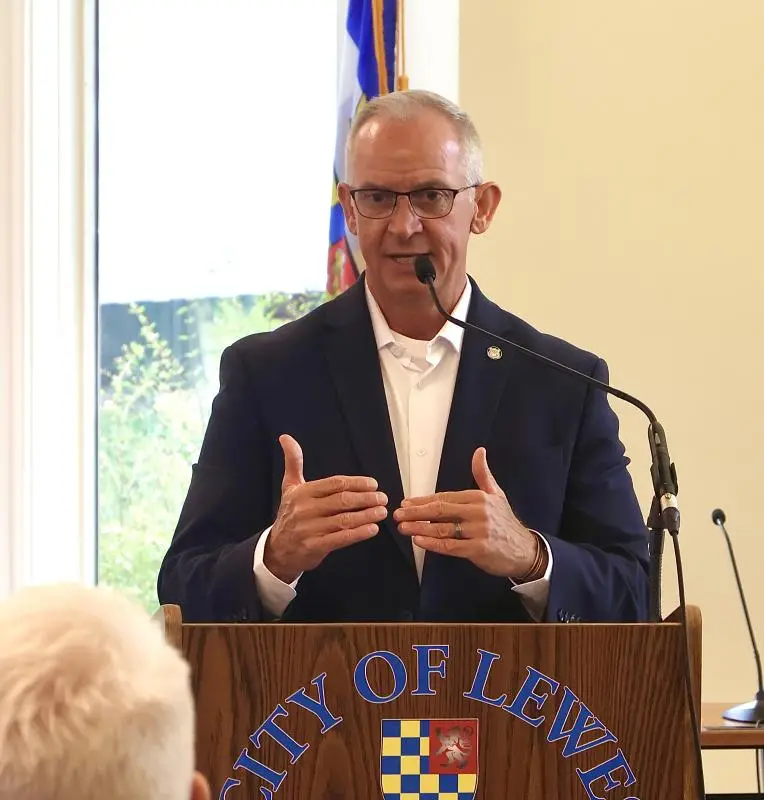-
 play_arrow
play_arrow
Radio Rehoboth

“It’s legal now. The adult-use market is around the corner.”
That was the message from Rob Coupe, Delaware’s marijuana commissioner, at a public workshop in Lewes July 18. Coupe came to update citizens and take questions about the rules and regulations of the soon-to-launch regulated weed market.
Coupe said the term recreational marijuana has gone up in smoke, replaced by adult use or regulated market.
“The goal is to minimize the illegal market, raise tax revenue for the state and compete against surrounding states that have legalized marijuana,” Coupe said.
Effective Sept. 1, Coupe will start accepting applications for 125 available licenses for cultivation, manufacturing, retail sales and testing.
Applications cost $5,000 and licenses will be awarded via a lottery system. “It will be like buying a $5,000 lottery ticket,” Coupe said. He said that cost is comparable to other states.
Licenses will be announced on the following timetable:
Nov. 1: 60 cultivation
Dec. 1: 30 manufacturing
March 1, 2025: 30 retail and five testing facilities.
Coupe said the final regulations for licensing adult-use marijuana will be adopted Sept. 11.
The state is targeting April 1, 2025, as the date retail sales would start.
The 13 retail locations that currently sell medical marijuana will also be permitted to sell adult-use marijuana. Those businesses will have to pay for a conversion license, which will be $100,000 or $200,000 depending on the type of license.
The goal is to have 43 dispensaries statewide. The number in Sussex County will be determined by percentages and population, according to Coupe.
Regulated marijuana sales will carry a 15% sales tax, the first sales tax in Delaware.
Stephen Provost and his mother, Margie Madigan, sat in the front row for Coupe’s presentation. Provost has owned ScuBEE’s CBD Boutique in Rehoboth Beach for five years. Currently, he sells hemp-based products that are part of the unregulated “gray” market.
Provost and Madigan were there to ask questions about the application process to jump onboard the new adult-use market.
“We’re going to throw our hat into the ring. Hopefully we get it,” Madigan said.
Provost said he would consider opening a marijuana business in Lewes, if the city allows the industry to come to town.
Lewes is the only beach town in Delaware that has not banned the manufacture and sale of recreational marijuana.
Provost would not be allowed to sell marijuana in his Rehoboth Beach store because of that city’s ban.
Madigan said Provost is an Iraqi War veteran and knows the benefits of the products and the stigmas surrounding them.
“It is kind of the wild west, and that’s why we would like to pursue it, with regulating, with testing and everything is getting done right,” Provost said.
Lewes Mayor and City Council is weighing whether to ban weed or take advantage of possible economic benefits it could bring.
Coupe gave his presentation to mayor and council in April. Mayor Andrew Williams and Councilmen Joe Elder and Tim Ritzert attended the latest briefing to gather more information ahead of any decision.
Municipalities will only directly benefit from regulated marijuana sales through the Justice Reinvestment Fund, which is managed by the Criminal Justice Council.
“This is where towns and communities would be competing for [money], if someone is creating a program addressing causes of crime, things like that,” Coupe said.
Coupe revealed the projected revenue from regulated marijuana:
- Application fees (estimating two applicants per license): $754,000
- License fees (if all 125 licenses are issued): $758,000
- Conversion fees (FY 25 first and second quarters): $4.2 million
- Sales and tax revenue (FY 25 fourth quarter and first full year FY 26): $281 million in sales, $42 million tax revenue.
Coupe admitted that some states have seen a decline in the legal marijuana industry. He said Colorado, which was one of the first to legalize weed in 2012, was once a destination for people who wanted to smoke. But now, surrounding states have also legalized it and Colorado is seeing layoffs and some businesses returning their marijuana licenses.
Some residents at the workshop raised issues about the impact of marijuana on health, like reactions with prescription medications.
Marilyn Ricci, who is a parent of someone living with mental illness, wanted Coupe to know educating parents, young people and medical professionals will go a long way.
“There are plenty of studies from the National Alliance on Mental Illness that show the young brain is very vulnerable to marijuana. The chances of having any mental illness are upped,” Ricci said.
Coupe said his current budget does not include any money for education. But, he said, he will ask for funding in his next budget and form partnerships with organizations to create an education component.
Coupe said people will all learn more about the impact of marijuana as more research is done.
“I’m nervous about where we’ll be in 10 years. Because we’re going to know more. Fifty percent of the people say, ‘It’s so good,’ but maybe the other 50% it doesn’t do good things for. It’s a decision, just like using cigarettes or alcohol,” Coupe said.
Go to Source:https://www.capegazette.com/article/state-marijuana-czar-talks-legal-weed-lewes/278444
Author: Bill Shull
Written by: RSS
Similar posts
Chart
Top popular

News Briefs 10/17/23
Board of Commissioners Workshop & Special Meeting – November 6

Six Sussex road projects considered in latest CTP
Knicks vs. Cavaliers prediction, odds, line, spread, time: 2023 NBA picks, Nov. 1 best bets from proven model
Tamar Braxton Says ‘Tamar 2.0’ Era Is More ‘Grown Up’ (Exclusive)
Copyright 2023 East Sussex Public Broadcasting, Inc.






